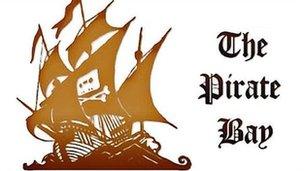The Pirate Bay must be blocked by UK ISPs, court rules
- Published
- comments

The Pirate Bay is hosted in Sweden, where it has an active supporter base
File-sharing site The Pirate Bay must be blocked by UK internet service providers, the High Court has ruled.
The Swedish website hosts links to download mostly pirated free music and video.
Sky, Everything Everywhere, TalkTalk, O2 and Virgin Media must all prevent their users from accessing the site.
"Sites like The Pirate Bay destroy jobs in the UK and undermine investment in new British artists," the British Phonographic Industry (BPI) said.
A sixth ISP, BT, requested "a few more weeks" to consider their position on blocking the site.
BPI's chief executive Geoff Taylor said: "The High Court has confirmed that The Pirate Bay infringes copyright on a massive scale.
"Its operators line their pockets by commercially exploiting music and other creative works without paying a penny to the people who created them.
"This is wrong - musicians, sound engineers and video editors deserve to be paid for their work just like everyone else."
'Compelling alternatives'
In November 2011, the BPI asked the group of ISPs to voluntarily block access to the site.
The request followed a court order to block Newzbin 2, a site also offering links to download pirated material.
The ISPs said they would not block the site unless a court order was made, as is now the case.
Virgin Media told the BBC it will now comply with the request, but warned such measures are, in the long term, only part of the solution.
"As a responsible ISP, Virgin Media complies with court orders addressed to the company but strongly believes that changing consumer behaviour to tackle copyright infringement also needs compelling legal alternatives, such as our agreement with Spotify, to give consumers access to great content at the right price."
The Pirate Bay was launched in 2003 by a group of friends from Sweden and rapidly became one of the most famous file-sharing sites on the web.
It allows users to search for and access copyrighted content including movies, games and TV shows.
No 'extra pennies'
In April 2009, the Swedish courts found the four founders of the site guilty of helping people circumvent copyright controls.
The ruling was upheld after an appeal in 2010, but the site continues to function.
The Pirate Party UK, a spin-off from the political movement started in Sweden that backs copyright reform, said this latest move will "not put any extra pennies into the pockets of artists".
"Unfortunately, the move to order blocking on The Pirate Bay comes as no surprise," party leader Loz Kaye told the BBC.
"The truth is that we are on a slippery slope towards internet censorship here in the United Kingdom."
'Pointless and dangerous'
Critics of site-blocking argue that such measures are ineffective as they can be circumvented using proxy servers and other techniques.
However, one analyst told the BBC that it was still worthwhile to take court action as it underlines the illegal nature of sites such as The Pirate Bay.
"I know it's fashionable to say 'oh, it just won't work', but we should keep trying," said Mark Little, principal analyst at Ovum.
"We should keep blocking them - they are stealing music illegally.
"The biggest culprits of this, really, are the younger demographic who just haven't been convinced that doing this is somehow morally uncomfortable.
"The principle that downloading music illegally is a bad thing to do has not been reinforced by schools or parents."
But Jim Killock, executive director of the Open Rights Group, called the move "pointless and dangerous".
"It will fuel calls for further, wider and even more drastic calls for internet censorship of many kinds, from pornography to extremism," he said.
"Internet censorship is growing in scope and becoming easier. Yet it never has the effect desired. It simply turns criminals into heroes."
- Published27 March 2012
- Published15 March 2012
- Published9 November 2011